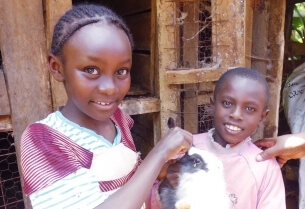Initatives run by the local church are bringing them closer to their communities and enabling them to work together to establish local development projects.
Churches are taking part in the unique Church-Community Mobilisation (CCM) process to realise their potential and help the community mobilise resources to meet their needs.
CCM is also known as Umoja, which means “together” in Swahili. In Bangladesh a pilot group have named the process Swarupantor, which means “self-transformation”, and in Guyana the Mothers’ Union are calling it Awaken.
These names highlight the key aims of the CCM process which is to transform individuals in the church and motivate them to look outward to their communities, working together to develop and meet the community’s needs.
Here are some of the examples that are running across the Anglican Communion:
Asia
In Bangladesh, the programme has already brought significant change to the community and to church leaders. Church-community relationships have improved remarkably, and innovative development projects are starting to take place.
Tree planting, environmental conservation and family visits to the sick and elderly are just some of the group’s initiatives with their local communities. Within the Church, contextual Bible studies and theological discussions are maintained to ensure that social and spiritual change is based on Christian teachings and values.
John Torun Mondal is the trainer for the programme in Bangladesh. He is excited about the response of the community and believes that Swarupantor is the process through which the needs of the people and present challenges such as climate change can be addressed with confidence and hope.
And Bishop Paul Sarker, Moderator of the Church of Bangladesh, said that Swarupantor would inspire the congregation to further connect with the church and its outreach.
Latin America and the Caribbean
Anglican Alliance’s Latin America and Caribbean Regional Facilitator, Paulo Ueti, and the Learning and Communications Manager, Christina Manning, recently visited the Awaken programme to learn more about CCM in a Guyanese context.
Paulo Ueti said, “It was wonderful to see what an organised community can do to make life better. The experience of training mostly women in Guyana was very rich and a good expression of how the Kingdom of God can be revealed through women’s ministry and caring for the community. The Mother’s Union are doing some excellent work in mobilising their churches and communities to get involved in development.”

Paulo continued, “CCM is an important process to get the community more organised and committed to their transformation. It empowers everyone, especially the most vulnerable, to take the lead to make a difference in their contexts. CCM is a powerful tool to help people question their reality and aim to change it – dismounting inequality, exclusion and poverty.”
Paulo will be looking at how the process can be adapted for use across Latin America and the Caribbean to engage churches across the region and support them as they reach out to meet the needs of those around them.
The process is highlighting the frontline work of the church around the world as it takes initiative in grassroots development. Anglicans and many other denominations are involved, and ecumenical groups meet regularly to share learning and discuss best practice.
CCM has seen what has been described as “only God-influenced increase in the last few years.” Richard Lister, Tearfund’s Global Church and Community Catalyst, recently shared statistics on the spread of CCM: 41 countries are now involved in the process, with 10,700 churches reaching 6.4 million people!
Africa
Within Africa learning from the CCM approach has already been shared across dioceses and provinces. In 2010, Tearfund and CAPA (Council of Anglican Provinces of Africa) hosted a workshop in Kenya bringing together five Anglican provinces to learn from the local example of Church-Community Mobilisation. Since then, the approach has been taken up across many African provinces.
This approach is supported by a number of Anglican agencies, including the Mothers’ Union, Us (formerly USPG), Episcopal Relief and Development and others. The Christian agency, Tearfund, is a core champion of the approach and partners with several Anglican provinces around the Communion. It is closely allied to the Samaritan’s Strategy of CMS Africa. These organisations work together with the Provinces to share learning and coordinate joint opportunities, for example in the training of local Umoja/CCM facilitators and the envisioning of church leaders.
Revd Fedis Nyagah has been serving as the Umoja Coordinator for Anglican churches in Africa since 2012, and is based at the CAPA office. Anglican Alliance Facilitator for Africa, June Nderitu, is working closely with Fedis to enable the sharing of best practice from the Umoja programmes across Africa and the Anglican Communion.
Top: Children taking part in a CCM project in the Diocese of Kirinyaga, Kenya.
Bottom: Facilitators in Guyana, working with a local community, put into action the tools they have learnt.

